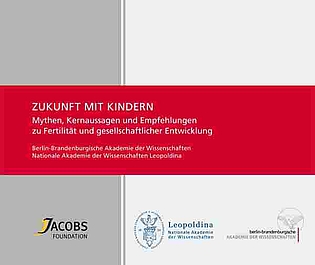News │ Thursday, 1. November 2012
Future with Children – demographic experts’ results now online

Now that the interdisciplinary academy working group “Future with Children – Fertility and Social Development” has published its findings, many of the myths surrounding the issue of birth rates and fertility have been replaced with facts. In these times of demographic change, the question of whether people decide to have children is more pressing than ever. But the number of children born is not the primary concern; scientists regard the quality of life enjoyed by children and parents as more important. In a nutshell, that is the result of an analysis of the available data jointly carried out by the Berlin-Brandenburg Academy of Sciences and Humanities and the German National Academy of Sciences Leopoldina.
The research project was made possible thanks to €1.25 million in funding provided by the Jacobs Foundation. The group compiled a list of recommendations on what needs to change in our society to improve the quality of life for parents and children – both now and in the future.
Why do people decide to have children? And why do some people who want children ultimately remain childless? In its systematic analysis, the interdisciplinary working group “Future with Children – Fertility and Social Development” attempted to shed light on these and other questions and find out the truth behind myths such as:
- “Low birth rates are a result of the increased number of women in the workplace”
- “Most women up to their early or mid-forties have no trouble falling pregnant.”
- “The quality of men’s sperm has deteriorated over the past decades.”
The international panel of distinguished experts in the field who compiled the study Future with Children – Fertility and Social Development has countered these unfounded popular assumptions with hard facts and has made recommendations to society and policymakers on how to ensure a better quality of life for parents and children.
“While academies published comprehensive papers on the threats and opportunities presented by longer lifespans and an aging society some time ago, there has been nothing comparable on fertility development,” said Prof. Günter Stock, President of the Berlin-Brandenburg Academy of Sciences and Humanities and the working group’s spokesman. The new, interdisciplinary study has finally closed this gap. “The study is pioneering because it is the first to integrate facts and analyses from the demographic, medical-biological, social and behavioural sciences and from the fields of family and social policy,” said Prof. Jörg Hacker, President of the German National Academy of Sciences Leopoldina.
This comprehensive study, entitled “Zukunft mit Kindern, Fertilität und gesellschaftliche Entwicklung in Deutschland, Österreich und der Schweiz”, edited by G. Stock, H. Bertram, A. Fürnkranz-Prskawetz, W. Holzgreve, M. Kohli, and U. M. Staudinger and published by campus Verlag 2012, is available in bookstores (in German) for €29.90. The brochure “Zukunft mit Kindern, Mythen, Kernaussagen und Empfehlungen zu Fertilität und gesellschaftlicher Entwicklung” (Future with Children: Myths, Key Facts and Recommendations on Fertility and Social Development) is available for download as a pdf.
Download
<link de publikationen detailansicht internallinkzeile>Brochure „Zukunft mit Kindern” (German)
Further Information
Website „Zukunft mit Kindern” (German)
<link de politikberatung wissenschaftliche-kommissionen demografischer-wandel internallinkzeile>Standing Committee „Demographic Change”
